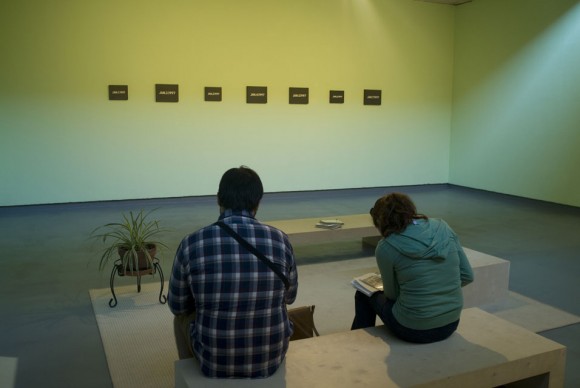San Francisco Art Institute Presents On Kawara: Pure Consciousness at 19 Kindergartens
SAN FRANCISCO, CA.- Beginning in 1998, New York City–based Japanese artist On Kawara subtly minimalized his longstanding already-minimalist Today series, the date-painting project he began in 1966. Still ritualistically maintaining the self-imposed constraints of the project (principally, that the date on which the painting was begun be its alphanumeric subject and that it be completed before the end of that day and, if not, destroyed), Kawara opted to modulate the reception of a week’s worth of these works (January 1 to January 7, 1997) by stationing them, under the title Pure Consciousness, in nineteen kindergartens across the globe.
Inasmuch as it presents an account of such modulated acts of reception, the archival project On Kawara: Pure Consciousness at 19 Kindergartens constitutes a kind of genealogical reprise, a third act in the drama of withdrawal that the kindergarten exhibitions themselves represent vis-à-vis the Today series as it existed—and, a fortiori, was exhibited— before 1998.

Inasmuch as it presents an account of such modulated acts of reception, the archival project On Kawara: Pure Consciousness at 19 Kindergartens constitutes a kind of genealogical reprise, a third act in the drama of withdrawal that the kindergarten exhibitions themselves represent vis-à-vis the Today series as it existed—and, a fortiori, was exhibited— before 1998
If the Today series (as exhibited prior to 1998) was marked by Kawara’s (and, thus, the beholder’s) compulsive concentration on the time of his life, then the act of withdrawal—the minimalizing of already-minimalist paintings—that Kawara’s Pure Consciousness intervention entailed was, in effect, a progressive undermining of the by-now-banal artworld face-off, here and now, between work and beholder. Indeed, the title Pure Consciousness itself bespoke a situation in which it was child-developmentally—if not exactly metaphysically—impossible for the work on display to be, properly aesthetically speaking, beheld. The “gardens of children” that made up the nineteen spaces in which the same seven paintings again and again came to loom were gardens whose instances of growth, whose creaturely inhabitants, were beings rather more like the ones being beheld, as it were by the thus newly animated paintings, the dates on whose surfaces, in each case, occurred within the as-yet-brief—the untimely—careers of the children themselves, seven days in the lives of each of them.
The purity of the consciousness in question thus could be seen as the children’s perfectly beautiful indifference to the spectacle of exhibitionism before which, be they never so fully alive and absorbed in the round of their activities, they could not even begin to know how to react, how to become present. It is this radical failure in the know-how of response, this “blindness” before the panopticality of artworks raised on high, this easeful neutrality, that the archival project On Kawara: Pure Consciousness at 19 Kindergartens aims to invite its own “beholders” to consider and, perhaps, to emulate—no doubt with the same unwitting theatricality and slight desperation that the sophisticated adult always betrays when attempting to rediscover within herself what Friedrich Nietzsche called, in Beyond Good and Evil, the seriousness that one had as a child at play (den Ernst . . . , den man als Kind hatte, beim Spiel).
Related posts:
- Montreal Presents World Premiere of Runa Islam’s “Magical Consciousness”
- The Valencian Institute of Modern Art Presents Sculptures by Xavier Mascaro
- Bortolami Presents Its Second Solo Exhibition of Work by Israel-Born Artist Avner Ben-Gal
- LACMA Presents Most Extensive Retrospective of John Baldessari to Date
- The Art Institute of Chicago Delves into Richard Hawkins’s Third Mind for Major Retrospective
